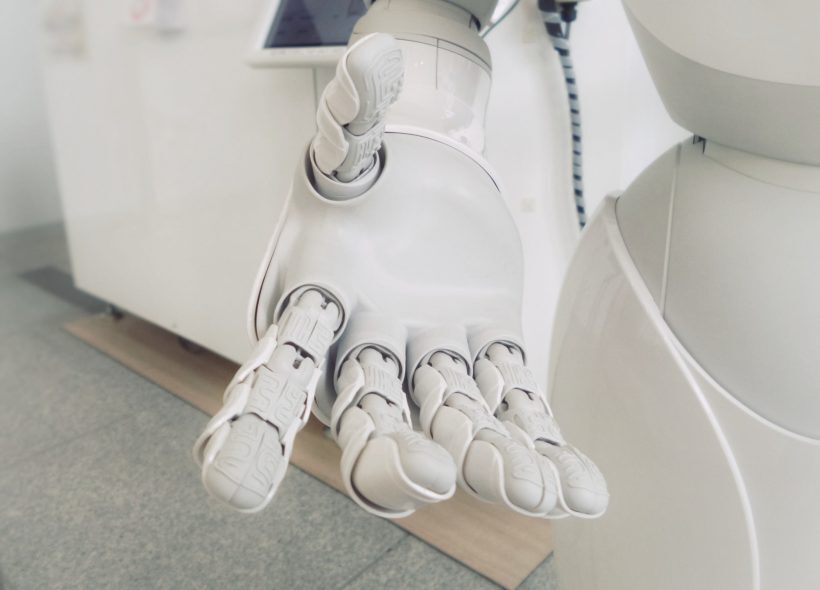Although many people might think that they do know what artificial intelligence and machine learning are, where they are applied, or what their benefits are, the truth is that they most probably have encountered them numerous times that day alone. When Spotify makes those personalized playlists for you, Netflix suggests new movies, or when Siri reminds you of the dentist’s appointment you have coming up— it is all related to artificial intelligence and machine learning.
But, regardless of how intelligent technology has evolved, it still needs humans to create the systems that work themselves. So, professionals in such fields are still in high demand, and throughout this article, we will discuss AI vs. machine learning vs. deep learning.
What Is Artificial Intelligence (AI)?
Artificial intelligence (AI) is the simulation of intelligent behavior displayed by computer systems through analyzing their environment and taking somewhat autonomous actions to achieve specific goals. To understand what AI is, you have to know how AI works, the techniques it encompasses, and have a sense of its chronology of development. According to the Defense Advanced Research Projects Agency (DARPA), the AI techniques are categorized into three primary waves known as the first, second, and third waves.
The first wave of AI techniques is crafted knowledge, and it helps create precise algorithms that a computer system can follow to respond intelligently to different situations.
The second wave of AI, also referred to as statistical learning, consists of data-driven statistical methods that enable inputs from the environment to translate into signals within the system. Then, the signals generate various outputs interpreted as the machine’s response.
The third wave of AI, or contextual adaptation, is not possible without current technology but refers to possible waves of AI in the future. These waves would use techniques that enable the machine to respond to a broader range of situations than the first and second waves.
How to get into AI?
Once you have decided to pursue a career in the AI field, it is essential to know where to start, especially if you are a complete beginner who has only just found out what AI is. Along the journey, to be successful in AI, you will need to, first and foremost, have a solid background in mathematics, linear algebra, probability, and statistics so you can understand artificial neural networks, basic AI algorithms, and even machine learning models. In addition, you must develop your skills in operating various programming languages, such as Python, R, Java, and C++, and have extensive domain knowledge.
Of course, it is possible to understand what AI is and develop some of the skills required for it on your own. Still, the most logical choice would be to pursue an artificial intelligence or computer science degree. Generally, such programs incorporate various classes related to AI, so you have the guidance of professionals while preparing for a career in this field.
Benefits of AI
Today’s artificial intelligence is designed to perform specific tasks that help make our lives simpler. AI has completely transformed how we gather information, analyze data, and even the insightful information we extract to help with decision-making through a wide range of tools. But, although AI has become part of our daily lives, there are still some particular domains where we can most easily notice the benefits.
Increased data input
AI machines can perform high-volume tasks without fatigue, such as analyzing large data sets and increasing data input. Although humans can deal with such tasks, data entry has risen significantly with advanced technology. The system utilizes advanced learning algorithms to easily and quickly find structure and trends in data which helps companies reduce the cost of handling the files with information. So, we benefit from AI machines because of their accurate data input and output quality.
Quicker decision-making
As previously mentioned, AI helps with faster and more accurate data processing, leading to quicker and more precise decision-making. Businesses can benefit significantly from AI since the machines can learn with each data-driven decision they make. So, in a way, the AI teaches itself to improve and build new decision-making models. According to reports, applications of AI within business functions through machine learning, computer vision, and natural language processing have resulted in revenue increase and achievement of goals.
Effectiveness and efficiency at work
Because AI enables many things to be done more quickly, effectiveness and efficiency in the workplace have increased. Rather than replacing jobs, AI targets specific tasks such as cyber security intrusions, which make the IT security professional’s job easier. So, AI is used to enhance teams’ capabilities in the workplace, thus helping them be more effective and efficient with their work.
For example, the emergence of AI writers has made it possible to automate many different marketing and writing tasks for any industry. In the world of content marketing, publishers and agencies are able to save up to 70% of the time and 60% of the cost to create content, thanks to blog automation. AI tools not only make writing fast and easy, but also improve output quality by providing writers with access to a wealth of information that human-only research can’t match. As a result, marketers and brands are able to easily scale – and increase their bottom lines.
Sustainable solutions
AI further proves beneficial by offering sustainable solutions that increase the global efforts to protect the environment. Ways AI proves to help with sustainability include using sensors within a building to monitor and optimize energy usage and the blend of AI with satellite imagery to detect changes in the earth’s surface due to natural disasters. Furthermore, AI machines record air quality, monitor ocean conditions and other environmental data in real-time.
How long does it take to get an AI degree?
The time frame of completing an AI degree program varies from one person to another. Many schools offer the option to enroll part-time or online, so some students earn the degree earlier, whereas others take more time.
Generally, like most Bachelor’s degrees, completing an AI Bachelor’s full-time program takes around 3-4 years. Then, if you want to be eligible for higher positions, you need to spend between 1-2 additional years to earn a master’s degree in AI, computer science, or another related field. So, all in all, you can start working in the field of artificial intelligence in 5-6 years. However, keep in mind that learning AI is a continuous process as technology advances, and you must keep up with it.
What can you do with an AI degree?
As AI’s application in various industries increases, so does the career potential for those who study this field. If you earn an AI degree and have the required knowledge and skill set for the tasks needed to develop AI systems and machines, you have numerous positions you can consider pursuing.
AI researchers
An AI researcher’s responsibilities circle around creating new AI systems to help data scientists and other professionals solve problems through information extracted from data. Daily duties can vary depending on the particular role within the organization you work for and your specialization within the AI field. You may have to conduct technical discussions with other employees and customers, develop new AI methods and approaches, develop and implement solutions for software problems, and contribute to new research areas.
Computer scientists
Typically, computer scientists work to find ways to innovate the already existing technologies, which in this case relates to artificial intelligence. This role would require you to explore various computing issues in order to develop theories and tools to solve them, as well as collaborate with data scientists to create new AI algorithms and other tools to make the systems more efficient, among many other tasks.
Data scientists
As a data scientist, your responsibilities might differ depending on the industry and sector you would be involved in. Generally, data scientists are primarily responsible for data mining and data processing to gather valuable insights from their operations. Then, they must use that information extracted from data to help the organization with decision-making and various business strategies.
Software engineers
Software engineers work with software development, including designing, constructing, and testing the systems. Furthermore, they analyze and, when necessary, modify existing software to ensure that the system can accomplish the tasks assigned to it, whether it be saving information, performing various calculations, or something else.
Data analysts
Data analysts use data analysis tools to gather meaningful information about trends and abnormalities from raw data. Other duties include performing analysis to evaluate the data’s quality, preparing reports on their findings and presenting them to the other IT professionals and management, designing and implementing data collection systems, dealing with corrupted data, etc.
What Is Machine Learning?
Machine Learning (ML) is an AI subfield of study related to constructing computer programs that can learn from data without being explicitly programmed. Although it is frequently linked with AI or computer science and has become more popular only in the last two decades, its history begins in 1950 when the first tests were conducted to determine if computers are capable of intelligence. Then, in 1985, the first research group for machine learning emerged, which served as a representative of the early machine learning community.
The general purpose of machine learning is to build models that learn from data and use them to recognize patterns. So, machine learning refers to a set of algorithms within computer systems. But, interestingly, the algorithms have been comprehended through data and experiences rather than being programmed that way.
How to get into machine learning?
If you want to break into the machine learning field, you must obtain the necessary knowledge and skills related to the tasks you will have to complete once you start working. Like with AI, you must have a thorough understanding of mathematics, specifically calculus and algebra, statistics, programming, and software. This knowledge and skills will help you work with machine learning tools like Tensorflow, Knime, Pytorch, Scikit-Learn, and others.
✅ Request information on BAU's programs TODAY!
Generally, to work in the machine learning field, you are expected to have completed a Bachelor’s degree and a Master’s degree in computer science or another related field. Moreover, if you aim for higher roles or positions, then a Ph. D. is another prospect to keep in mind.
Benefits of machine learning
There are many benefits to including machine learning in today’s world. Thanks to ML, companies can generate positive outcomes with less time and effort put into the work. If you are interested in knowing more about how machine learning can elevate your company’s goals, let’s have a look at some of the many benefits machine learning brings.
Automation of everything
Machine Learning makes it possible for companies and their employees to reduce workloads by designing advanced computer systems that automatically analyze large data sets and identify patterns. Since the algorithm deals with such complicated assignments, automation gives employees the freedom to work on other tasks.
Wide range of applications
We encounter machine learning daily in various industries that depend on it to get things done. Some of the industries utilizing machine learning include:
Finance
By analyzing data related to a person’s transactions, the system learns the pattern of their spending and notices any abnormalities with unusual transactions that can be potentially fraudulent. Furthermore, machine learning can help assess credit and risk management by using algorithms to provide mitigation recommendations.
Healthcare
In this industry, machine learning uses data to identify patterns and abnormalities within patients’ records, which can help diagnosis. In addition, through that same ability of ML to detect patterns within data sets, scientists can predict potential side effects and results of some drugs without the need to experiment with them.
Marketing
Machine learning makes personalization possible for each customer, as the algorithm uses the collected data to suggest and advertise products based on previous purchases and search history.
Efficiency in handling data
It is no surprise that with the continuous growth of technology and the online world, more and more data is produced every day. So, now more than ever, companies need to handle data efficiently, which is not possible without the use of Machine Learning.
How long does it take to get a machine learning degree?
As previously mentioned, most positions related to machine learning require at least a Master’s degree, which you earn in 1 to 2 years, on top of the 3-4 years needed to complete your Bachelor’s degree. Both degrees are preferred in computer science or some other related field. When pursuing high-level positions, you will need to go through an extra four years Ph. D. program that will ensure you go in-depth into the field of machine learning.
Generally, you will have to commit 5-6 years to pursue a Master’s degree in machine learning, although you might reduce or extend the period you spend in school through the format you choose for the program.
What can you do with a machine learning degree?
Machine learning has become crucial to helping businesses make better-informed and quicker decisions. So, with the increase in demand for professionals in this field, many positions will be available for you to pursue while earning your degree.
Machine learning engineer
Machine learning engineers are responsible for developing AI software that automatically produces predictive models for various uses. These professionals deal with other tasks like assessing and ensuring that algorithms generate accurate suggestions to customers, refining machine learning objectives, keeping up with every new development in the machine learning and AI field, and many other duties due to possible complications.
Business intelligence developer
Business Intelligence Developers work with other IT professionals to develop systems that attain information for decision-making. They are responsible for maintaining the company software to help guide business strategies, identify and resolve data quality issues, perform code debugging and technical troubleshooting, perform reviews to ensure data integrity, and any other assigned duty.
Human-centered machine learning designer
Human-centered machine learning designers aim to design and develop programs, applications, and machines that help solve issues experienced by customers. They must always be well-informed about people’s complaints and problems, then use coding language and specific programming tools to find solutions.
Software developer
Software Developers use their knowledge of programming languages to design and develop software programs. Their duties include:
- Creating algorithms for the new systems.
- Collaborating with other IT professionals and the customers to identify user requirements.
- Maintaining the existing software in the company.
- Writing reports on findings as a guide for future software development projects.
Natural language processing (NLP) scientist
As an NLP scientist, you will be responsible for converting natural language data into functional elements utilizing natural language processing techniques to provide classification algorithms to the system. Other duties include designing and developing NLP applications and systems per customer requirements, performing statistical analysis and evaluation experiments on each model, and much more.
The Difference Between AI And Machine Learning
Now that you have a better understanding of each term, it’s time we see the difference regarding machine learning vs. AI. The primary difference is that machine learning is a type of AI. The same thing can be said even when discussing deep learning vs. machine learning vs. AI, for example, since both ML and deep learning are areas that fall under the umbrella term of artificial intelligence.
While AI aims to mimic human intelligence and behavior through systems, machine learning is the domain that provides us with the tools to achieve that aim. So, ML is a subset of AI, a sort of underlying technology that refers to a system’s simulation that enables its algorithms to learn themselves without being programmed.
On the other hand, when considering machine learning vs. deep learning vs. AI, another difference arises since while ML enables systems to function without human interference, deep learning aims to use structures modeled based on the human brain. Since deep learning falls under the term AI and is a subset of machine learning, its differences to AI apply to ML also.
Other differences can also be detected when considering the available job options for each path, the benefits, and the industries where they are applied to most.
As mind-blowing as the technologies behind artificial intelligence and machine learning seems to be, the truth is that this is only the beginning. Looking back at the difference between the AI of 50 years ago and today, one can only imagine what the future has in store for this field.
If you want a front-row seat to the show, pursue one of these paths. Whether it be the more general route of AI or machine learning specifically, the possibilities of what they might bring to your future and the world are endless.











